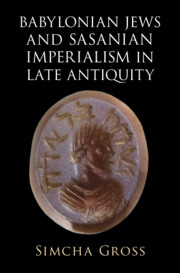Book contents
- Babylonian Jews and Sasanian Imperialism in Late Antiquity
- Babylonian Jews and Sasanian Imperialism in Late Antiquity
- Copyright page
- Contents
- Acknowledgments
- Introduction
- 1 Jewish Society under Sasanian Rule
- 2 Competing for Power
- 3 Beyond ‘Tolerance’
- 4 Forgetting Persecution
- 5 Rabbis and Fire Temples
- 6 Kings and Religion in the Talmud and in the Imagination of Sasanian Communities
- Conclusion
- Bibliography
- General Index
- Source Index
4 - Forgetting Persecution
Memory and Anti-martyrdom in the Babylonian Talmud
Published online by Cambridge University Press: 04 April 2024
- Babylonian Jews and Sasanian Imperialism in Late Antiquity
- Babylonian Jews and Sasanian Imperialism in Late Antiquity
- Copyright page
- Contents
- Acknowledgments
- Introduction
- 1 Jewish Society under Sasanian Rule
- 2 Competing for Power
- 3 Beyond ‘Tolerance’
- 4 Forgetting Persecution
- 5 Rabbis and Fire Temples
- 6 Kings and Religion in the Talmud and in the Imagination of Sasanian Communities
- Conclusion
- Bibliography
- General Index
- Source Index
Summary
Following attacks by Syriac Orthodox Christians around 792, a group of Maronite monks in northern Syria appealed to Timothy I, the Catholicos of the Church of the East, to intervene on their behalf with the Caliph, with whom the Catholicos was believed to have a close relationship. In his response, Timothy encouraged the Maronites to join his own church, noting that its many martyrs established its theological purity:
For if anyone says that the soil of the east is the soil of holy martyrs, he is never far from the truth. For [during a period of] about four hundred years of Persians [rule], violence and murder did not cease from the Church of the East (ʿedtā d-madnḥā). And in all this time and duration of killing and persecution, Satan could never pillage the riches of their confession, nor make any addition or diminution [therefrom].1
- Type
- Chapter
- Information
- Babylonian Jews and Sasanian Imperialism in Late Antiquity , pp. 166 - 196Publisher: Cambridge University PressPrint publication year: 2024

